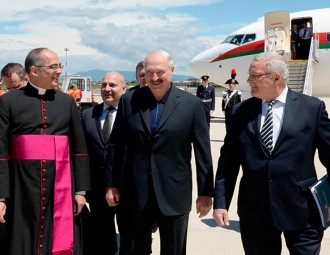Valery Karbalevich: Lukashenka really wants to go on a tour to European capitals
 president.gov.by
president.gov.by
Since Europe is not eager to deal with Lukashenka, the EU may have to get to the EU through the "back door" – through the Vatican.
On May 20-21 Aliaksandr Lukashenka paid a visit to Italy and the Vatican. The trip ended with an invitation to visit Belarus from the Belarusian leader to the Italian President Sergio Mattarella and Pope Francis. That's the only result of Lukashenka’s two-day trip to the Apennines.
What meaning does the official Minsk put in the Italian-Vatican tour? What for the Belarusian authorities play the European card? And how long will the next honeymoon between Minsk and Brussels last?
Political analyst Valery Karbalevich answers the questions of the "EuroBelarus" Information Service.
- Why did Lukashenka decide to make his first official visit to the EU after the abolition of sanctions specifically to Italy and the Vatican?
- There are several versions of why Lukashenka did that.
First, there are problems with the invitation: there are no countries in Europe that want to see Lukashenka and invite him for a visit. Therefore, it is necessary to get to the EU through the "back door" - through the Vatican.
A trip to Italy was strange indeed: it’s unknown who invited Lukashenka to go to Rome; the status of the visit is unclear, too. The Italian Prime Minister, who is the first person of the country, didn’t receive the Belarusian leader. All this suggests that the visit to Italy took place together with a trip to the Vatican.
Secondly, Italian politicians have always been more loyal to Lukashenka than other European politicians; we can recall the visit of former Italian Prime Minister Berlusconi to Minsk. In addition, Italy is more loyal to Russia in comparison with other EU countries, so the visit won’t cause much irritation in Moscow, as it would have happened with a visit to Brussels or Berlin.
- Meeting with Italian President Sergio Mattarella and Pope Francis were rather symbolic (at least no one reports about any specific decisions). Why?
- Meetings were of a symbolic, ceremonial, ritual character. President of Italy is a ceremonial, symbolic figure; in fact, it has basically no effect on the economy. Italian President has merely demonstrated a friendly attitude towards Belarus.
It was purely a PR visit aimed at creating a picture for Belarusian viewers: seclusion has been broken. After all, Lukashenka has not been in the EU since 2009.
- Lukashenka invited the Pope to visit Belarus. Can such visit be real, while Belarus is under the patronage of the Russian Orthodox Church?
- Lukashenka invited the Pope to visit Belarus, but no response followed. The Holy See gives no respond to Lukashenka’s offer; therefore, the probability of such a visit isn’t high. Although this possibility has still increased compared to the situation, which we had a year ago, because of the Pope's meeting with Patriarch Kirill in Cuba. It is quite possible that some progress in the normalization of relations between the two churches has began, and the probability of a visit has slightly increased. Although the silence of the Vatican speaks for itself.
- In general, the official Minsk is actively playing the "European card". What goals do the Belarusian authorities pursue in renovation of relations with the European Union?
- Belarusian authorities solve several problems.
Firstly, Belarus wants to have a pivot as a counterbalance to the Russian influence, to broaden the space for maneuvering, but not be limited by Russia, relations with which are developing quite hard.
Secondly, to put some pressure on Russia, saying that if Russia won’t give as much money as Belarus asks than we will leave for Europe. It's an old tactic of the official Minsk, which seems to be working if it is still applied.
The third task is purely pragmatic, material: investments, loans, and cooperation with international financial organizations. It is obvious that without the normalization of political relations the chances of getting a loan from the IMF are unreal – it was not by accident that Belarus received the previous loan during the normalization of Belarus-EU relations in 2008-2010. And now there are ongoing negotiations with other European financial institutions: the European Investment Bank and the World Bank. Besides, the opportunity to host Belarusian Eurobonds at European markets is much easier when political relations are normal.
And finally, a purely psychological point: Lukashenka really wants to go on a tour to European capitals; it’s obvious. He has an inferiority complex that he is not allowed in Europe, so even from this point of view it is very important for him to visit Italy and the Vatican.
- Belarusian-European relations under Lukashenka’s rule have always been depending on the political situation. How stable and longstanding is the current trend of political thaw?
- It is hard to make forecasts. If Belarus will suddenly start to turn the screws, if political prisoners appear, the European reaction will be quite negative. And European trend will either slow down or stop, or go into reverse. And the presence of political prisoners depends on the threat that the authorities see their opponents. If serious social, labor, political conflicts will start in Belarus, the authorities will have a tough reaction, which will inevitably cause problems in our relations with Europe.
-
03.01
-
07.10
-
22.09
-
17.08
-
12.08
-
30.09








































